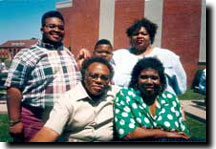 |
|
 |
|
|
Clyde Biggins #23084-077 |
 Clyde with his family |
20 Years, Drug Conspiracy In a few months I will be 56 years old. I am a black male sentenced to 20 years. I'm in prison on the words of two government witnesses who outright lied on me during my trial. One of the government witnesses received 17 years. He went home in less than 5 years. The other government witness against me received 12 years, and he went home after 7.
I had a very successful business going for me, I was a pillar in my community, and yes, I was active in my church. But the government doesn't care who I was or what I was about. I have been taken away from my family, and now, after 36 years of marriage, I am losing my wife. Twenty years of my life has been taken away because of lies: the cooperation of codefendants turning informants (snitches) for the federal government for lesser sentences.
The informant system lends itself to terrible abuse, in drug cases especially, when snitching seems the only way to save yourself from decades in prison. This justice system encourages snitches and encourages lies. It ensures that people with information can inform on underlings with less information. If it was up to me, I would give up using snitches altogether. What is happening with snitching in drug cases is unjust and corrupt. Because of mandatory sentencing laws, I am doing 20 years for some bad choices I made. Prisoners my age call it Mandatory Death Sentencing Laws.
I hear younger prisoners talking about their brief past, where they were raised, how they were raised. They sit and brag about how many girls they left behind, how many were pregnant, which girls have children they fathered. So many of them say they've never seen their children. To them it's bragging and boasting, but to me it's stupidity. I don't blame the young men. I blame the government for building prisons instead of schools.
While holding conversations with these young men, I find the majority want to make something out of their lives. I hear their silent cries. I see invisible tears. I see them smile to hide the pain deep within. They want help. They need help. They just don't know how to ask for help. They let their pride and egos hold them back.
This is why the prison system should have motivational classes to help inmates find identity, both personal and social. Something must happen before and after release so they can learn practical skills of survival in a community that they care about and that cares about them.
I remember freedom, but I now I have lost everything, my community, my church, my business, my family - and most recently, my wife. They've taken everything away but my dignity and pride.
Updated - 1/1/01
|
|
|